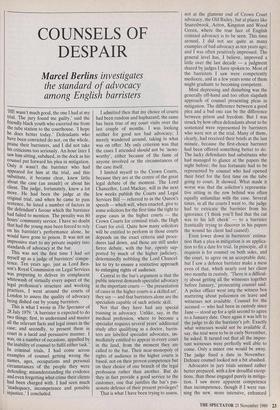COUNSELS OF DESPAIR
Marcel Berlins investigates
the standard of advocacy among English barristers
TIE wasn't much good, the one I had at my trial. The jury found me guilty,' said the friendly black youth who escorted me from the tube station to the courthouse. 'I hope he does better today.' Defendants who have been convicted do not, on the whole, praise their banisters, and I did not take his criticisms too seriously. An hour later I saw him sitting, subdued, in the dock as his counsel put forward his plea in mitigation. Only it wasn't the barrister who had appeared for him at the trial, and this substitute, it became clear, knew little about the case (an assault) or about his client. The judge, fortunately, knew a lot more. He had been the judge at the original trial, and when he came to pass sentence, he listed a number of factors in the defendant's favour which the barrister had failed to mention. The penalty was 80 hours' community service. I have no doubt that had the young man been forced to rely on his barrister's performance alone, he would have gone to prison. It was not an impressive start to my private inquiry into standards of advocacy at the bar.
This was not the first time I had set myself up as a judge of barristers' compe- tence. Ten years ago, just as Lord Ben- son's Royal Commission on Legal Services was preparing to deliver its complacent whitewash of virtually every aspect of the legal profession's structure and working practices, I went around the courts of London to assess the quality of advocacy being dished out by young barristers.
This is what I wrote in The Spectator of 28 July 1979: 'A barrister is expected to do two things: first, to understand and master all the relevant facts and legal issues in the case; and secondly, to present them in court in a lucid and persuasive manner. I was, on a number of occasions, appalled by the inability of counsel to fulfil either task.' In criminal trials, I had come across examples of counsel getting wrong the names, ages, occupations and personal circumstances of the people they were defending; misunderstanding the evidence and even forgetting what crime their clients had been charged with. I had seen much `inadequacy, incompetence and possible injustice,' I concluded.
I admitted then that my choice of courts had been random and haphazard; the same has been true of my court visits over the last couple of months. I was looking neither for good nor bad advocacy; I merely wandered around, taking in what was on offer. My only criterion was that the cases I attended should not be 'news- worthy', either because of the fame of anyone involved or the circumstances of the case itself.
I limited myself to the Crown Courts, because they are at the centre of the great legal debate of the moment. The Lord Chancellor, Lord Mackay, will in the next few weeks publish the Courts and Legal Services Bill — referred to in the Queen's speech — which will, when enacted, give to some solicitors for the first time the right to argue cases in the higher courts — the Crown Courts for criminal trials, the High Court for civil. Quite how many solicitors will be entitled to perform in those courts depends on the exact criteria and proce- dures laid down, and those are still under fierce debate, with the bar, openly sup- ported by much of the higher judiciary, determinedly nobbling the Lord Chancel- lor to try to ensure a restrictive approach to enlarging rights of audience.
Central to the bar's argument is that the public interest demands specialist advocacy in the important courts — 'the presentation of cases in the higher courts is a skilled art', they say — and that barristers alone are the specialists capable of such artistic skill.
Not that they have had any special training in advocacy. Unlike, say, in the medical profession, where to become a specialist requires several years' additional study after qualifying as a doctor, barris- ters are labelled specialist advocates, im- mediately entitled to appear in every court in the land, from the moment they are called to the bar. Their near-monopoly of rights of audience in the higher courts is based, not on their proven competence but on their choice of one branch of the legal profession rather than another. But do they in fact provide a good service to the customer, one that justifies the bar's pas- sionate defence of their present privileges?
That is what I have been trying to assess, not at the glamour end of Crown Court advocacy, the Old Bailey, but at places like Snaresbrook, Acton, Kingston and Wood Green, where the true face of English criminal advocacy is to be seen. This time around, I did not see quite as many examples of bad advocacy as ten years ago; and 1 was often positively impressed. The general level has, I believe, improved a little over the last decade — a judgment shared by judges I have spoken to. Most of the barristers I saw were competently mediocre, and in a few years some of them might graduate to becoming competent.
Most depressing and disturbing was the generally off-hand and too often slapdash approach of counsel presenting pleas in mitigation. The difference between a good plea and a bad one can be the difference between prison and freedom. But I was struck by how often defendants about to be sentenced were represented by barristers who were not at the trial. Many of them, clearly, had received their briefs at the last minute, because the first-choice barrister had been offered something better to do. The lucky defendants had substitutes who had managed to glance at the papers the night before; the less fortunate had to be represented by counsel who had opened their brief for the first time on the tube going to court. It showed. What made it worse was that the solicitor's representa- tive sitting in the row behind was often equally unfamiliar with the case. Several times, in all the courts I went to, the judge had to extricate the barrister from his ignorance CI think you'll find that the cut was to his left cheek' — to a barrister frantically trying to discover in his papers the wound his client had caused).
Even lower down in barristers' estima- tion than a plea in mitigation is an applica- tion to fix a date for trial. In principle, all it requires is for counsel on both sides, and the court, to agree on an acceptable date, but I saw a defence barrister make a mess even of that, which nearly cost her client two months in custody. 'There is a difficul- ty about getting all the witnesses together before January,' prosecuting counsel said. A police officer went ints1 the witness box muttering about policemen on leave and witnesses not available. Counsel for the accused — who had been in custody since June — stood up for a split second to agree to a January date. Once again it was left to the judge to do the barrister's job. Exactly what witnesses would not be available if, say, the trial were to be in early November, he asked. It turned out that all the impor- tant witnesses were perfectly well able to come. Only a minor one would be away. The judge fixed a date in November. Defence counsel looked not a bit abashed.
Advocates in jury trials seemed rather better prepared, with a few dreadful excep- tions, than those engaged purely in mitiga- tion. I saw more apparent competence than incompetence, though if I were run- ning the new, more intensive, enhanced advocacy training course being introduced this year for budding barristers I would concentrate on the rudiments of cross- examination, not many of which seemed to be known to many of the barristers I saw in action. A startled 'What? Are you sure?' is hardly the sophisticated response to the unexpected answer.
Many, too, seemed ill at ease in address- ing a jury, trying vainly to find a happy level between legal-speak and over- familiarity. Most embarrassing were the attempts to speak to the jury in what the barristers must have thought to be the ordinary language of the people. Such false attempts at ingratiation ('We all fancy a cuppa from time to time, don't we?') sounded merely patronising. One case neatly symbolised the whole issue over rights of audience. It was not typical, but it made its point. A young barrister, in his twenties, was cross-examining a prosecu- tion witness, the victim of an alleged vicious assault. Clearly out of his depth and probably the recipient of a last-minute brief, he spent much of his time hunched over, listening to the increasingly desper- ate solicitor sitting behind him. 'Ask him what he was doing there in the first place,' he whispered. The barrister stood upright and posed the question firmly. The answer given, he resumed his crouch to he told what to ask next. This went on for four or five questions. The young man in a wig is the one they call a specialist advocate.











































































 Previous page
Previous page